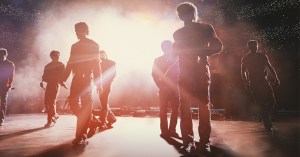Best Movies Off the Radar 2020
A selection of RT staff favorites from an unprecedented year of shuttered theaters, streaming debuts, production delays, and postponed release dates.
Like most other industries, Hollywood was thrown for a loop when COVID-19 reared its ugly head and forced communities all over the world to impose rather strict stay-at-home orders. With widespread theater closures in effect, all of the major movie studios began shifting their biggest titles further and further back in the release calendar, until most of them just threw their hands up and tossed everything over to 2021. In other words, we saw an unprecedented drop in the number of movies released this year, and even the ones that did come out were frequently too small to draw any attention. With that in mind, the staff here at RT present a small handful of our favorite underseen films of the year, just in case you missed them entirely or simply forgot they existed. Read on for the full list.
The Assault on Precinct 13 playbook, patterned after Rio Bravo, is flung back into wild Western territory with Bacurau. Set in the remote, dusty mountains of Brazil, Bacurau’s people begin their wicked and righteous tale with the funeral of the village matriarch. Apparently, she served as a sort of spiritual ward, as her death opens their world to a pile-on of bad juju, including UFO sightings, bullet holes appearing in tankers, and Bacurau itself disappearing off maps. When friends and family start getting assassinated, the townspeople must unite for a last stand, and in the process unleash their own hidden history of bloody retribution. So, here’s a movie that not only satisfies on genre thrills, but once you get the big reveal as to why the town is being besieged (involving a devilishly hammy Udo Kier), its clear writers/directors Kleber Mendonça Filho and Juliano Dornelles dress the screen in gore and carnage with social purpose, transforming Bacurau into parable.
Available on: Amazon, FandangoNOW, Google Play, iTunes, Vudu
Beanpole, directed with unwavering intensity by the mind-bogglingly young Kantemir Balagov, is not a breezy watch. It announces as much with an uncomfortably intimate opening shot of the titular character, Iya “Beanpole” Sergueeva, in a catatonic state. A nurse and veteran working at a Leningrad hospital in the immediate aftermath of WWII, she is wheezing through the lingering aftershocks of a concussion sustained during the war. Watching her struggle to regain her breath is so unnerving that you might just lose your own.
Iya, played by Viktoria Miroschnichenko with a childlike meekness that belies her striking physicality, becomes tragically indebted to her former comrade Masha, who makes an unreasonable demand for restitution. Things only get grimmer from here. Miroschnichenko is terrific, but Vasilisa Perelygina — who plays the spiteful Masha — is absolutely astounding; her name ought to be inscribed onto a mountaintop. This is her debut performance, which is both remarkable and oddly fitting. Her every mannerism, from the resigned rage in her eyes to her disquietingly forced smile, is wholly unique. It’s as if the camera has never before captured a presence quite like hers.
Beanpole is the kind of clenched viewing experience that is endured rather than enjoyed. However, when measured by its sheer depth of feeling, it’s pretty unbeatable. Becoming invested in Iya and Masha is as easy as falling over a ledge: it’s a simple fact of gravity.
Available on: Amazon, FandangoNOW, Google Play, iTunes, Vudu
There’s a lot you’ll likely find familiar about Driveways, a story of lost and lonely souls finding connections across generational and racial lines. The film focuses on a young boy (Lucas Jaye) and his mother (Hong Chau), who move into her late sister’s home to clean it out and prepare it for sale; while there, the boy forms a friendship with a Korean War veteran (Brian Dennehy) who lives next door. The understated story avoids some of the beats you might be expecting – little is made of the fact the young mother and son are Asian-American and how that might affect their relationship with the vet – and renders the slow-forming bond between the trio with tenderness and gentle humor. Chau further cements her growing reputation as a talent with extraordinary range (and her quiet work as a struggling single mom here next to the cold villainy of her turn in Watchmen) and Jaye is believable and charming as the loner kid. But it’s Dennehy, weary, grizzled, but fully open-hearted, who makes this small film something hugely special.
Available on: Amazon, FandangoNOW, Google Play, iTunes, Vudu
Indonesian director Joko Anwar is one of the most exciting horror talents working today, and Impetigore might be his most effective – and surprisingly moving – film to date. The story is free-wheeling and complex, but essentially involves a young woman returning to her ancestral village, where she’s inherited a house. Is it haunted? Probably. Why do the locals seem so suspicious of her? We’re about to find out. This incredibly atmospheric film kicks off with what might be the tensest horror opening of the decade – a strange man terrorizes a toll booth worker – and from there piles on killer set pieces and unforgettable imagery at a clip. Indonesia selected Impetigore as its entry for the Oscars’ international feature category; we hope the Academy takes a risk on this genre gem and shortlists it.
Available on: Shudder
When director Matt Wolf began working on Spaceship Earth, there was no way he could have known how eerily relevant his film would be when it finally saw release. The documentary, which premiered at Sundance in January last year, chronicles the inception, construction, progression, and ultimate termination of the notorious real-life science experiment known as Biosphere 2. Born of an idea cooked up in a counterculture commune, Biosphere 2 was meant to be an entirely self-sufficient enclosed ecosystem that would serve as a prototype for the kinds of facilities humans might require to live, say, on the surface of Mars. Because, you know, at this rate, that’s looking more and more like an inevitability. Spaceship Earth details how the Biosphere 2 project came to life, who the eight “lucky” souls were that cloistered themselves inside the 3.14-acre facility from 1991 to 1993 (yes, two whole years), and what — aside from “people suck” and “life is hard” — we all learned from it. It’s a fascinating, absolutely bonkers look not just at a remarkable and exceptionally unique experiment, but also at the social nature of humanity itself and our capacity both to enrich and to impair the lives of those around us. Throw in the fact that it debuted on Hulu in May, smack dab in the middle of widespread coronavirus lockdowns, and you’d be hard pressed to find more appropriate quarantine viewing.
Available on: Amazon, FandangoNOW, Google Play, Hulu, iTunes, Vudu
Hunter Conrad seems to have it all. She’s married into a wealthy family, and her place within it solidifies once she becomes pregnant with her partner’s child. Her days are spent tending to her stylish, modern home and attending dinner parties. The movie lulls you into believing this a story of upper-middle-class ennui that could be resolved with a job outside the home and a newfound sense of purpose, but Hunter’s problem is not that simple. The film becomes a lovingly shot but no less visceral body horror movie as Hunter’s drive to ingest objects that were not meant to enter a digestive tract grows out of control. It speaks to Haley Bennett’s performance that throughout it all, we empathize with her. We cringe when she picks up a thumbtack, and feel her relief when it’s out of sight. We feel her confusion as she tries to understand and reign in her compulsion to endanger herself now that all of her immediate needs are finally met. More than anything, however, Swallow is a reminder that if we don’t confront our demons, they may devour us, or we may end up devouring them.
Available on: Amazon, Google Play, iTunes, Vudu
Thumbnail images by ©IFC Films, ©CJ Entertainment, ©Kino Lorber








